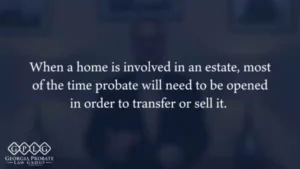Changing property ownership after someone’s death could be a complex process, influenced by various legal proceedings and formalities that must be fulfilled appropriately. Typically, one of the most common steps you need to consider is related to transferring home and other real estate. Whether you are an heir or a beneficiary, you might wonder how the transfer of property after death without a will or with a testament might work and whether a house can remain in the name of a late person.
Below, we’ll discuss some possible scenarios regarding transfer ownership after someone passes away, if it is possible to bypass transfer title during probate, and common challenges that might occur during this process.
How Can You Transfer Property After Death?
When a person dies, their properties must typically go through probate proceedings to be distributed to the heirs and beneficiaries, whether the late person left a will or not.
Probate is a court-supervised process of paying debts, closing accounts, and distributing the remaining assets of a person after their death.
During probate, real estate belonging to the deceased will either be sold to pay their debts or transferred to a beneficiary. The process is different depending on whether the estate personal representative wants to sell or transfer and the situation in the estate.
To sell the property, the executor or administrator either needs expanded powers that authorize the sale or must file a petition for leave to sell and have it approved by the probate court.
This is a significant step and a common area where the estate personal representatives get themselves into trouble.
If you have been appointed as an administrator or an executor and need to sell a property, we advise you to consult an experienced probate attorney.
However, when speaking about the transfer of the decedent’s real estate property, there might be typically two situations:
- Transfer of property after death without a will.
- Transfer of the decedent’s property after death when the late person has a will.
Transfer of property after death with will
Usually, when a property owner dies and leaves a will, that property becomes part of the deceased’s probate estate.
Once the probate court has validated the will and appointed the nominated executor to act on behalf of the estate, he may oversee the estate administration and assets’ distribution to the named beneficiaries.
However, before transferring the property to its new owner, the estate’s personal representative must ensure they have paid all the creditor claims, estate expenses, and taxes. When there is insufficient money in the estate account to close all the debts, the executor might decide to sell the property before an heir can inherit it.
This decision will be based on the size of the mortgage and debts and considering any other assets.
The executor or administrator can transfer the property into the beneficiary’s name only after all the estate’s financial obligations are satisfied.
Transfer of property after death without will. What happens to a house when the owner dies and there is no will?

When a homeowner passes away and does not leave a will, the probate assets will go through probate and are distributed by the estate’s administrator according to the Georgia Intestate Succession Laws.
Depending on the estate situation, the administrator will decide whether to sell the decedent’s house and other real properties to cover the debts, estate expenses, taxes, and other legal fees associated with the probate proceedings.
If the personal representative doesn’t sell the home, it will be distributed to the Next of kin rights.
Transfer of Property After Death With and Without Will in Georgia
When it comes to the transfer of property after death without a will in Georgia or switching the ownership of a house when the deceased owner has a will, most estates undergo probate.
However, this process may look different, depending on each situation:
Property transfer with a will
- The probate process begins when the last will and the decedent’s death certificate are filed with the probate court.
- The nominated executor in the will is officially appointed to handle the estate administration. He must pay the funeral expenses, the decedent’s outstanding debts, other estate costs, fees, and taxes. Only then can he distribute the remaining assets (including the property) to the designated beneficiaries.
If the decedent’s last will stated that the house would be transferred to the designated beneficiaries and there were no estate debts or the estate’s money entirely covered them, the executor would transfer the house to the beneficiaries.
When the decedent died intestate:
- The probate court will appoint an administrator to handle the late person’s estate.
- The local probate court will follow the Georgia intestate laws, usually using the next-of-kin designation to determine who the decedent’s beneficiaries are and distribute them accordingly.
- If the property was solely owned by the decedent, the heirs will receive their share of the property once all estate creditors are satisfied.
Can Property Be Transferred Without Probate?
One of the main questions we receive is, “Is it possible to bypass property transfer during probate?”.
The simple answer is it depends. If the deceased named a designated beneficiary on the asset in question, then the property may transfer directly to that beneficiary.
The most important methods to avoid probate are:
Trust

To transfer your property without going through probate, you may put it into a trust. The successor trustee will transfer it to the named beneficiary without going through the probate.
Our firm has found that trusts can sometimes cause issues for the Trustee or Executor because, many times, the trust does not include all of the deceased’s assets. That can cause the Trustee and/or Executor to have to do double the amount of work to administer the deceased’s estate.
Property Held in Joint Tenancy with Right of Survivorship (JTRWOS)
When you hold a property in Joint Tenants With Rights Of Survivorship arrangement, it means that when there are two names on the deed and one person dies, his property shares automatically transfer to the surviving owner without needing to go through probate transfer to be effective.
For JTWROS to work, the property title must expressly include the right of survivorship. You can apply JTRWOS not just to real estate properties but also to financial accounts (for example, bank accounts).
Transfer of Death Deeds (TODD)
Transfer of death (TODD) is a legal document allowing you to transfer your real property to a named beneficiary upon death without going through probate. To use a TODD, you must execute the deed while still alive and record it with the county recorder’s office.
TODD has been recognized in Georgia since the 1st of July 2024.
How Long Do You Have to Transfer Property After Death?

In the state of Georgia, there is no specific deadline for transferring property after someone’s death. It all depends on the evolution of the probate process.
Usually, a non-dispute estate takes between 12 and 18 months to complete, but estate administration may take years for more complex cases.
It depends on how well family members cooperate, the complexity of the estate, and the probate court system.
Common Challenges in Property Transfer
Many challenges might occur, and the timelines needed for each step in the property transfer process are prolog. Here are some of them:
Disputes among beneficiaries and heirs
Conflicts among the deceased’s heirs and beneficiaries can add additional steps in the probate process and postpone the property transfer. Legal arbitration or mediation could help resolve disputes amicably.
Inaccurate documentation
Incorrect or missing documents could delay or even stop a property transfer. To avoid this situation, you should ensure that you collect and verify all necessary documents before initiating the transfer of the estate’s assets.
Litigations
Legal objections can also delay the transfer process, many of them being related to contesting a will. Contesting the transfer of property after death without a will or with a testament demands substantial evidence of wrongdoing or neglect, so it is advisable to have a skilled attorney on your side.
Delays in reaching consent
Any delay in reaching consent between the late person’s heirs and beneficiaries will postpone the probate process and automatically, the distribution of the decedent’s estate to those who inherit property.
To avoid these tricky situations, we advise you to talk to a probate lawyer who may help you ease and speed up the process of reaching consent between the decedent’s family members.
How to Transfer Property After the Death of a Parent with a Will?

Typically, two scenarios could apply:
When both parents have a will that lays out how their properties will be distributed among beneficiaries
When both parents pass away together, and each has a valid will, the distribution of their assets follows the instructions in their respective testaments.
The wills need to be current, clear, and legally valid. The appointed executor for each testament will carry the will’s wishes, including settling debts and distributing assets.
When just a parent has a valid will
In this case, both parents’ estates might go through probate, especially when they die simultaneously. The properties of the parent with the last will would be distributed according to its terms, and the executor will oversee the probate process.
When there is no will, the probate court will appoint an administrator to handle the late parent’s estate. In this case, the Georgia intestacy laws determine the distribution of the assets belonging to the parent without will.
How to Transfer Property After the Death of a Parent Without a Will?
When neither parent has a will, Georgia’s intestacy laws apply. These laws outline how assets are distributed when someone dies without a valid will and determine the order of inheritance among the family members.
As the specifics may vary depending on each family’s situation, we advise you to consult a probate attorney to tailor the process to your unique situation.
How Long After Probate Can a House Be Sold?
As previously mentioned, no specific state laws in Georgia dictate how long a house can remain in a deceased person’s name.
When it’s a non-probate asset, the house could be transferred almost immediately to the new owner’s name. When it’s a probate asset, the transfer of property after death without a will or a last testament depends on the length of the probate process.
What Happens If a Deceased Person Has No Heirs?
When a late person doesn’t have a surviving spouse, children, or any close family member to inherit their assets, a distant relative would receive the decedent’s assets.
Property Transfer Costs
Property transfer fees are paid when real estate ownership is transferred from one individual to another and are typically based on the property’s sales price or assessed value.
As each jurisdiction has its own regulations and rates, the amount can vary significantly, depending on the property location.
Final Notes
Whether it’s about the transfer of property after death without a will or with a last testament, this process could be complex and challenging in a probate context. Any wrong decision can have far-reaching and costly consequences, so we always recommend you consult an experienced probate attorney. Call our office at (770) 796-4582 to speak with one of our team members.
More information
Disclaimer These websites have not been reviewed by Georgia Probate Law Group and are not endorsed or even recommended by Georgia Probate Law Group. These websites are additional resources that you can use to further your general education on this topic.
Disclaimer: The information above is provided for general information only and should not be considered legal advice. Our probate attorneys provide legal advice to our clients after talking about the specific circumstances of the client’s situation. Our law firm cannot give you legal advice unless we understand your situation by talking with you. Please contact our law office to receive specific information about your situation.



























